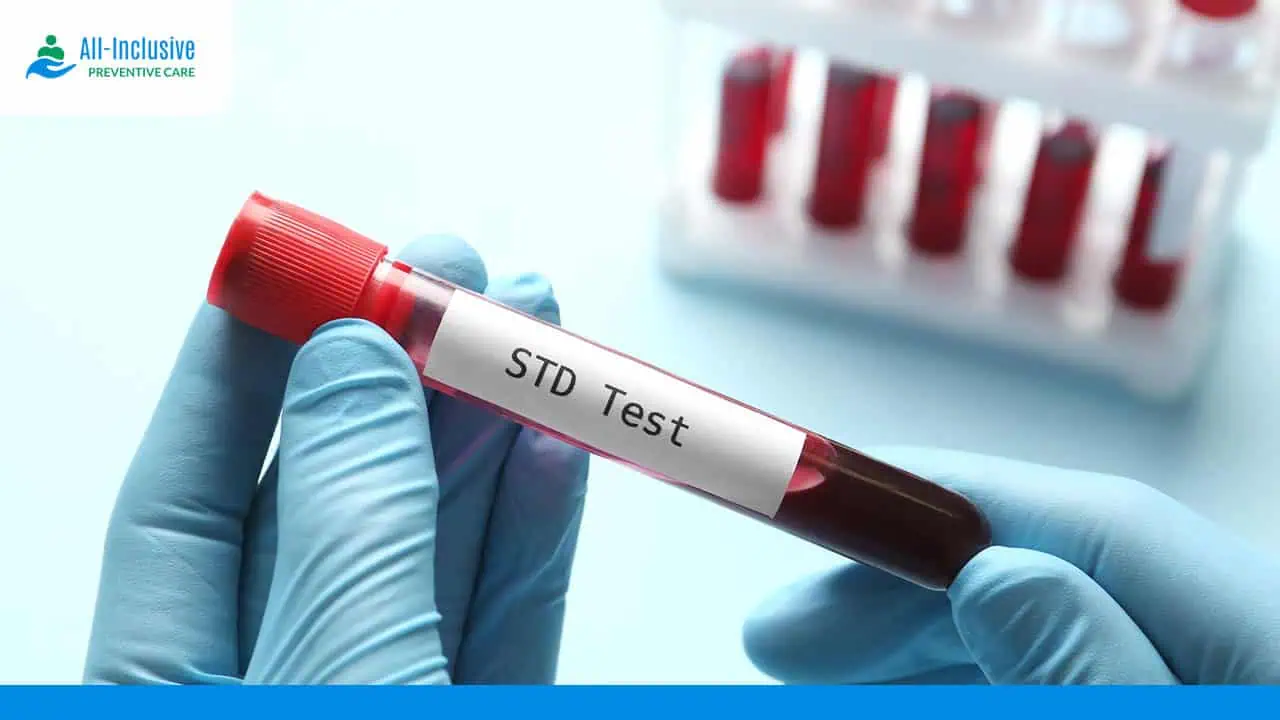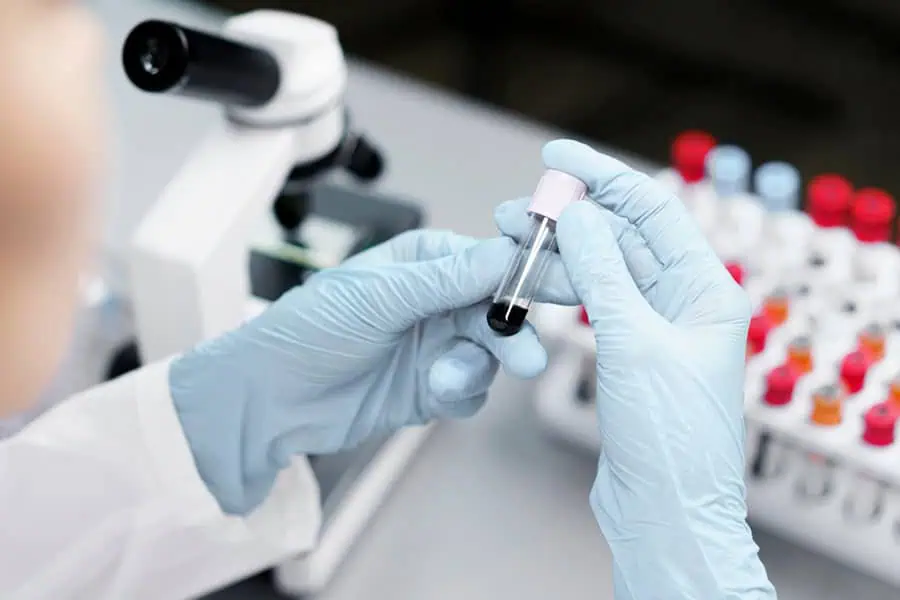STD Testing in Miami Lakes: What Men & Women Need to Know

Getting tested for STDs is a vital part of protecting your health. Many infections have no symptoms, so routine screening ensures early detection and treatment. Whether you're sexually active with multiple partners or in a monogamous relationship, regular medical tests help you stay informed and safe.
If you need STD screening, All-Inclusive Preventive Care in Miami Lakes offers confidential testing and primary care services to support your sexual health.
Key Takeaways
- Regular STD screening is crucial for all sexually active individuals; men should test every 3-6 months, while women should test annually or more frequently if symptomatic.
- Common STDs in South Florida include chlamydia, gonorrhea, syphilis, and herpes; be aware of symptoms like unusual discharge, sores, or pain during urination.
- Hepatitis B vaccine and medication are available to reduce the risk of virus infections and associated inflammation.
- Local community health centers in Miami Lakes offer free or low-cost medical tests, providing accessible resources for patient care.
- Normalizing discussions about STDs helps reduce stigma—anyone sexually active is at risk, regardless of sexual orientation.
Importance of STD Testing
Regular STD screening is essential for early detection, effective treatment, and better health outcomes. Many infections are asymptomatic, meaning that they do not show symptoms but are still contagious, which is why testing is critical—even if you feel healthy.
Why Is STD Testing Important?
- Detects infections early – Many bacteria, viruses, and parasites that cause STDs can go undetected without testing.
- Prevents complications – Conditions like pelvic inflammatory disease (PID), urethra infections, or ectopic pregnancy can develop if STDs are left untreated.
- Reduces transmission – Identifying and treating infections promptly helps prevent the spread to sexual partners.
- Protects reproductive health – Some STDs, such as chlamydia and gonorrhea, can lead to infertility if untreated.
- Prevents community spread – If you test positive for an STD, it’s important to inform your current and recent sexual partners, as they may be infected without knowing or may have transmitted the infection to you. Sharing this information allows them to get tested and treated, helping to prevent asymptomatic spread and protect public health. The recommended timeframe for notifying partners varies by infection.
Who Should Get Tested?
Primary health care providers recommend routine STD screening for:
- Individuals engaging in sexual intercourse, oral sex, or unprotected sex with multiple partners.
- Anyone who has had a new sexual partner or shares needles during drug use.
- Pregnant women – Untreated STDs can cause pregnancy complications, including premature birth or low birth weight.
What Infections Should You Be Tested For?
The Centers for Disease Control and Prevention (CDC) and World Health Organization (WHO) recommend regular testing for:
- HIV
- Hepatitis B & Hepatitis C
- Syphilis
- Chlamydia & Gonorrhea
- Herpes Simplex Virus (HSV)
- Trichomonas Vaginalis (a parasite that causes vaginal and urethral infections)
Why Early Detection Matters
Regular testing can help catch a sexually transmitted illness or disease easy to prevent long-term health issues such as:
- Inflammation, pelvic pain, and chronic infections.
- Increased risk of other sexually transmitted infections if left untreated.
- Weakened immune system from viral infections like HIV or hepatitis B.
If you are pregnant, schedule a pregnancy test along with an STD screening to ensure a healthy pregnancy.
Common STDs in Miami Lakes
Understanding sexually transmitted diseases (STDs) in South Florida can help you make informed decisions. Many STDs are transmitted through body fluid exchange during oral sex, sexual intercourse, or blood-to-blood contact, such as shared needles in drug use.
Most Common STDs in Miami Lakes
| STD | Trending Rates in Miami Lakes |
| Chlamydia | High |
| Gonorrhea | Increasing |
| Syphilis | Rising |
| HIV | Stable |
| Herpes Simplex Virus | Common |
Certain STDs, such as hepatitis A, hepatitis B, and hepatitis C, can lead to liver inflammation, chronic disease, and immunodeficiency, making vaccination an important step in prevention.
Untreated infections may cause long-term complications, including rashes, fever, immune system suppression, or chronic inflammation. Local community health centers and urgent care centers provide evaluation, physical examinations, blood tests, urinalysis, and medication for treatment.

Symptoms to Watch For: When to Schedule STD Testing in Miami Lakes
Recognizing STD symptoms is key to early medical test detection. Some infections, such as hepatitis B, hepatitis C, and HIV, may show no signs for months. Health care providers recommend testing if you experience:
- Unusual discharge from the sex organ (penis, vagina, or urethra)
- Pain or discomfort during urination (urine test may be required)
- Sores, blisters, or warts on the pelvis, cervix, or vulva
- Unexplained fever, rash, nausea, sore throat, or cough
- Pelvic pain, vaginal bleeding, or symptoms of inflammation
- Diarrhea, fatigue, or significant weight loss (which can be signs of a weakened immune system due to infections like HIV)
If symptoms arise, immediately visit a doctor, nurse practitioner, or primary care physician. Some infections can spread beyond the sex organ, affecting the mouth, throat, skin, or immune system.
Routine hospital, urgent care, or community health center testing ensures early diagnosis. You can also visit your primary care doctor in Miami Lakes at All-Inclusive Preventive Care for testing and treatment.
Where to Get STD Tested in Miami Lakes
Finding a trusted health care provider for STD screening is essential. Below are different testing options based on your needs:
Walk-In Clinics & Community Health Centers
These locations provide affordable in-person testing and consultations with a health care provider:
- Community Health Centers – Offer low-cost STD screening, physical examinations, and treatment with a primary care physician or nurse practitioner.
- Urgent Care Centers & Hospitals – Facilities like Jackson Health System and Miami Lakes Community Clinics provide same-day physical exams, blood tests, and vaccinations.
Laboratory Testing Centers
If you prefer direct lab testing, these facilities specialize in diagnostic screenings:
- LabCorp & Quest Diagnostics – Conduct blood tests, urinalysis, antibody testing, and antigen detection to diagnose infections.
- Pharmacies & MinuteClinics (CVS & Walgreens) – Offer medical tests, pregnancy tests, and immunization services for STD prevention.
At-Home STD Testing Services
For discreet and private testing, you can order at-home STD test kits that allow you to collect a urine, blood, or swab sample from home. These tests are then mailed to a lab for processing.
- Online Testing Services – Order at-home urine tests, blood tests, and antigen screenings, with results reviewed by a licensed physician.
Important Disclaimer: Not all at-home STD tests are created equal. To ensure accuracy and reliability, choose a test from a reputable company that is CLIA-certified (Clinical Laboratory Improvement Amendments) and FDA-approved. Be cautious of unverified online sellers, as inaccurate results can lead to missed infections or unnecessary concern.
Regardless of where you get tested, ensure the facility follows Centers for Disease Control and Prevention (CDC) guidelines, which set national standards for STD testing, treatment, and prevention.
For convenient and affordable STD testing in Miami Lakes, visit our primary care services page.
Testing Frequency Recommendations
Health care professionals recommend STD screening based on sexual behavior, substance abuse history, and medical conditions:
- Every 3 to 6 months – If you have multiple sexual partners, engage in oral sex, or are at high risk.
- Annually – If in a monogamous relationship and previously tested.
- Immediately – If you experience fever, rash, pelvic pain, vaginal bleeding, or urethra discomfort.
- During pregnancy – Women should be tested early and again in the third trimester.
Medicare, Medicaid, and most private health insurance plans often cover STD screening, blood tests, and vaccinations, making routine testing more accessible.
Understanding STD Test Results
Understanding your results is crucial after a blood test, urinalysis, or antigen screening.
| Result | Implication |
| Negative | No infection was detected. Continue practicing safe sex and consider follow-up testing if recent exposure is a concern, especially for infections with a "window period" (e.g., HIV or syphilis). |
| Positive | An infection was detected. Follow up with a healthcare professional for confirmation, treatment options, and advice on notifying sexual partners. |
Even if your results are negative, continue practicing safe sex by using condoms (made of latex or polyurethane) or dental dams, which act as protective barriers against infections spread through sexual contact.
Prevention Strategies
Preventing STDs is vital for reproductive health and immunity. Here are some key strategies:
- Use a condom or dental dam – Protects against infections caused by bacteria or viruses.
- Limit partners – Reduces risk of inflammation, pelvic pain, or bleeding.
- Get tested regularly – Early medical tests ensure antibiotic or antiviral therapy is started promptly.
- Avoid substance abuse – Alcohol and drug use can increase risky sexual behavior.
- Get vaccinated – Hepatitis A, hepatitis B vaccine, and HPV immunization can prevent serious infections.
Vaccinations for STDs in Miami Lakes
Vaccines protect against viral infections that cause disease. Key vaccines include:
- Hepatitis A, Hepatitis B, and Hepatitis C vaccines – Prevent liver inflammation chronic disease, and weaken the immune system, making the body more vulnerable to infections.
- HPV Vaccine – Reduces risk of cervix and throat cancers linked to human papillomavirus.
Many hospitals, pharmacies, and community health centers in Miami Lakes offer immunization, often covered by health insurance. Visit a health professional for vaccination guidance.
Resources for Support
Finding health care support can be just as important as STD screening and vaccinations. Whether you're navigating a recent diagnosis or seeking information about safe sex, medication, or immunization, it's important to connect with the right resources.
In Miami Lakes and South Florida, various organizations offer education, counseling, and financial assistance for STD testing and treatment.
Consider These Resources to Support Your Sexual Health:
- Local Health Clinics & Community Health Centers – Many offer free or low-cost STD screening, physical examinations, pregnancy tests, and HIV/AIDS support. Some also provide birth control, family planning, and immunization services.
- Support Groups – Join groups to discuss safe sex, gender health, sexual orientation concerns, and treatment options for hepatitis B, hepatitis C, HIV, and other infections.
- Online Health Forums – Engage anonymously on platforms discussing sexual health, medication options, symptoms, and antibody testing.
- Mental Health Professionals & Therapy Services – Seek counseling for anxiety, depression, or sexual health concerns related to diagnoses like herpes simplex virus or HPV.
- Community Health Events & Education Initiatives – Organizations like Florida International University, University of Miami, and Jackson Health System offer STD awareness programs, free medical tests, and public health screenings.
You can also visit a primary health care provider, urgent care center, or hospital for blood tests, urinalysis, vaccination, and medication options. Many facilities accept Medicaid, Medicare, and private health insurance to cover the costs of testing and treatment.
Take Control of Your Sexual Health: Get STD Testing in Miami Lakes
Staying informed about STD testing and prevention is essential for your health and well-being. By recognizing common symptoms, knowing where to get tested, and understanding prevention strategies, you can take charge of your sexual health. Don't forget the importance of vaccinations and seeking support when needed. Whether you need routine testing or a consultation with a primary care doctor, All-Inclusive Preventive Care in Miami Lakes is here to help.
Call (305) 200-3141 or visit us at our Miami Lakes location, to schedule your appointment today. You can also explore our primary care services and annual gynecological exams to ensure comprehensive sexual health care.
